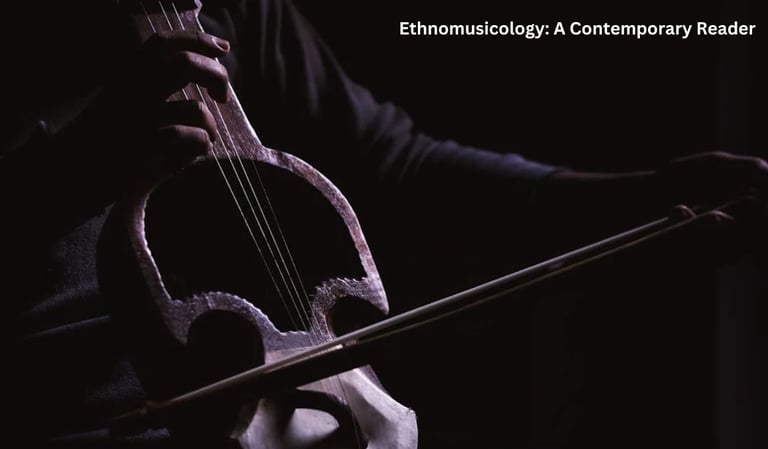Exploring the World of Ethnomusicology Must-Read Books
exploring the art of music
1/7/20254 min read
"Exploring the World of Ethnomusicology: Must-Read Books"
Ethnomusicology opened more doors for a better understanding of music as a representation of human experience. It is nearly close to what has been traditional about musicology. It emphasizes the technical side of music more than viewing it as an everyday experience or a part of their Culture and identity. In the following sections, we'll highlight some essential books that comprehensively overview ethnomusicology and its subfields, from historical foundations to contemporary studies.
This concept discredits the idea that music can be understood wholly without considering the surroundings in which it is performed.
Global Diversity of Music
Appreciation for diversity in international music is, of course, the other very central idea in Ethnomusicology. Researchers analyze broad musical heritage from different parts of the world, varying from Indigenous to the sounds within the urban jungles. That is, one will look not just at traditional Western classical genres but appreciate a vast array of musical styles that come with others' practices.
Participant Observation
Ethnomusicologists' most frequently used research technique is participant observation. The book gives an overview of the field, while the authority in the field, Bruno Nettl, describes its development over time and introduces its central concerns and methods. It contains a broad array of topics, ranging from the role of ethnomusicologists to fieldwork methods and the interaction between music and Culture.
Main Features:
Summary of thirty-one core topics in ethnomusicology
• Context with the discipline: history and evolution
• Methods of conducting fieldwork and ethics engaged
. It examines the relationship of music to the cultures in which it exists. Anthony Seeger uses his fieldwork in Brazil as a source for case studies on how music functions within various cultural settings.
The Music of Africa by John Miller Chernoff remains a classic in ethnomusicology, particularly concerning the vast African musical heritage. Chernoff does well to indicate how music plays out amid many African cultures, includingincluding masses to be used during rituals, ceremonies, and even community functions. The book has been very well appraised with its fieldwork approach and the study of African musical philosophies.
Main Features:
•Research in African music and Culture
•Phenomenological study of the philosophies of music and performance in Africa
•Case studies that involve different regions and ethnic groups in Africa
Why You Should Read It:
It is one of ethnomusicology's most comprehensive research to survey African music. The book needs to be read by those interested in African musical practices and elaborates on how the music relates to Culture in African society.
4. "Music, Society, Education" by John Blacking
John Blacking's Music, Society, Education is a thesis on how an experience of musical education influences cultural identity and social development. He is known and appreciated for his work with people from Southern Africa, specifically the Venda people. The book indeed has case studies where music was central to socializing and community lifestyle.
Key features
•Studying and analyzing the impact of music on socialization identity
•African and European in-situ findings
•Nature of music education and its cultural implications
Why You Should Read It:
It is a must-read for one who wants to know how music relates to education and social change. Blacking's study shows how music impacts cultural identity and brings people together.
5. "Ethnomusicology: A Contemporary Reader" by Jennifer C. Post
A great example of essays an editor compiled in Ethnomusicology: A Contemporary Reader by Jennifer C. Post. The compilation is wide-ranging, so the material it can afford readers becomes broad and deep enough to outline the whole gamut of topics currently relevant to ethnomusicology. Examples of topics within that scope include globalization, music and politics, and ethical issues in ethnographic research. To that end it might be priceless in attempting to get a hold of the fluid nature and shifting contours of the field.
Features
Comprehensive collection of essays on contemporary ethnomusicology
• Coverage includes music and politics, identity, and globalization, among other topics.
It helps clarify issues regarding ethics as well as the methodology of research.
Why You Should Read It:
This reader provides a broad view of ethnomusicology's current trends and challenges. It is helpful for students and scholars who wish to understand the changing landscape of ethnomusicological research.
In this text, Merriam explores ways music is considered from a cultural anthropological standpoint with frameworks for thinking about musical traditions as part of such a discipline. It benefits those looking to understand how music is approached through an anthropological lens.
3. Key Topics in Ethnomusicology
Apart from the recommended books, some crucial themes within ethnomusicology will help shape your perception of the subject. The literature covers such issues, which offers more contextual meanings in studying music and Culture.
1. Globalization and Music
Ethnomusicologists examine how music functions as a form of artistic expression, identification, and power.
2. Music and Politics
Music is used as an expression of politics; in place of that, music is used to express the will of a country. Ethnomusicologists analyze music's role in political events, protests, and society.
3. Music and Religion
Most musical traditions are heavily connected with religious activities. Ethnomusicologists analyze the role played by music in rituals, ceremonies, and spiritual worship.
Conclusion: Multiplying Information in Ethnomusicology
Ethnomusicology, as a subject, offers profound insights into how music shapes and reflects cultural identity. These books are among the most significant resources for one looking to enter this interdisciplinary area. Whether a student, scholar, or music lover, reading these works will broaden your appreciation for the global diversity of music and its role in society.





